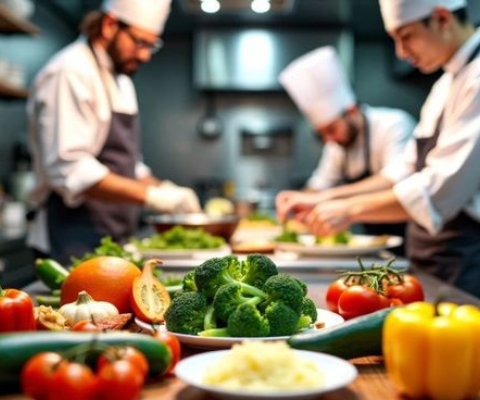Food trends evolve rapidly, influenced by culture, innovation, and global events. The latest food trends not only redefine the way we eat but also reflect our collective values, such as sustainability, wellness, and creativity. Let’s dive into the flavors, ingredients, and concepts shaping our plates today.
The Rise of Plant-Based Cuisine
One of the most dominant latest food trends is the growth of plant-based cuisine. More people are embracing vegetarian and vegan diets, driven by environmental concerns, health benefits, and ethical considerations. Restaurants and grocery stores are responding with innovative options like plant-based meats and dairy alternatives that mimic traditional products without compromising taste or texture.
Innovative Plant-Based Ingredients
Gone are the days of plain tofu and tempeh. Today’s plant-based revolution includes:
- Jackfruit: Used as a meat substitute in dishes like pulled “pork” sandwiches.
- Chickpea-based products: From pasta to snacks.
- Mushroom protein: A sustainable and flavorful alternative.
These innovations ensure that plant-based diets remain exciting and accessible, making it a central focus of the latest food trends.
Tech in the Kitchen: Smart Cooking
Technology is transforming kitchens worldwide. Smart appliances, AI-driven recipe apps, and automated gadgets are among the latest food trends reshaping how we prepare and enjoy meals.
AI and Personalized Nutrition
AI tools now analyze dietary preferences and health data to recommend personalized meal plans. This technology ensures meals are tailored to individual needs, making eating healthier and more efficient. Apps can suggest recipes based on what’s already in your fridge, reducing food waste—another crucial trend.
3D-Printed Food
While it may sound futuristic, 3D-printed food is becoming a reality. This innovation allows chefs to create intricate designs or custom textures for dishes, redefining presentation and personalization in the culinary world.
Global Fusion: A Melting Pot of Flavors
Another key highlight of the latest food trends is the blending of global cuisines. Fusion dishes that combine flavors from different cultures are gaining immense popularity. Think Korean tacos, sushi burritos, or Indian-inspired pizzas.
Spotlight on Regional Ingredients
Chefs are celebrating regional ingredients and techniques, introducing diners to:
- Fermentation: Influenced by Korean kimchi and Japanese miso.
- Exotic spices: Za’atar, sumac, and gochugaru.
- Street food inspiration: Elevated versions of dishes like bao buns, arepas, and samosas.
This trend celebrates diversity and highlights the beauty of cultural exchange through food.
The Era of Functional Foods
People now want their meals to do more than just taste good. Functional foods—those with added health benefits—are a major part of the latest food trends. These include items fortified with probiotics, antioxidants, and adaptogens that boost immunity, digestion, and mental clarity.
Examples of Functional Food
- Gut-friendly drinks: Kombucha, kefir, and other fermented beverages.
- Superfood powders: Spirulina, maca, and ashwagandha added to smoothies or baked goods.
- CBD-infused snacks: Promoting relaxation and stress relief.
Sustainable Eating: A Conscious Choice
Sustainability is at the core of many latest food trends. Consumers are demanding transparency and eco-friendly practices from food producers and restaurants. This shift is evident in the rise of:
Zero-Waste Cooking
Chefs are finding creative ways to use every part of an ingredient, minimizing waste. For example:
- Vegetable scraps are used in broths and sauces.
- Overripe fruits become jams or dessert bases.
- Fish bones and shells are transformed into flavorful stocks.
Locally Sourced Ingredients
Farm-to-table dining emphasizes fresh, locally grown produce. This approach supports local farmers, reduces transportation emissions, and ensures top-quality ingredients for consumers.
Social Media’s Role in Food Trends
Social media platforms play a pivotal role in promoting the latest food trends. Instagram, TikTok, and YouTube have become hubs for food enthusiasts to share recipes, discover new dishes, and set viral trends.
Viral Food Challenges
Challenges like whipped coffee, baked feta pasta, and rainbow bagels not only captivate audiences but also encourage experimentation in home kitchens. These trends showcase the creativity of the culinary community and inspire millions to try new recipes.
Aesthetic Foods
The demand for “Instagrammable” meals continues to grow. Chefs and food brands focus on:
- Vibrant colors using natural ingredients like butterfly pea flower or beetroot powder.
- Unique shapes and plating styles.
- Interactive elements like melting desserts or DIY meal kits.
The Future of Dining Out
Dining experiences are also evolving as part of the latest food trends. Restaurants are adapting to new consumer expectations by offering:
Ghost Kitchens
These delivery-only establishments allow chefs to experiment with menu concepts without the overhead costs of traditional restaurants. Ghost kitchens cater to the growing demand for convenient, high-quality takeout and delivery options.
Immersive Dining
Dining is no longer just about food—it’s about the experience. Immersive dining concepts include:
- Thematic menus based on movies or seasons.
- Augmented reality (AR): Enhancing the ambiance with interactive visuals.
- Pop-up events: Exclusive, limited-time dining experiences.
Beverage Innovations
The latest food trends extend to beverages, with exciting developments in coffee, tea, and cocktails.
Non-Alcoholic Spirits
As more people seek healthier lifestyles, non-alcoholic spirits are making waves. Brands are crafting complex, alcohol-free alternatives to traditional liquors, offering options like:
- Alcohol-free gin and whiskey.
- Botanical-infused sparkling waters.
- Mocktail kits for home use.
Experimental Coffee
Coffee lovers are exploring beyond standard espresso and cold brew. New trends include:
- Nitro coffee: Infused with nitrogen for a creamy texture.
- Mushroom coffee: Blended with adaptogenic mushrooms for health benefits.
- Coffee cocktails: Creative blends of coffee with unexpected ingredients like citrus or herbal liqueurs.
Conclusion
The latest food trends showcase a fascinating mix of innovation, sustainability, and cultural celebration. From plant-based innovations to tech-driven kitchens and immersive dining, these trends redefine our relationship with food. As the culinary world continues to evolve, staying informed about these trends ensures that you can enjoy the best of what’s on offer—while supporting a healthier, more sustainable future.


